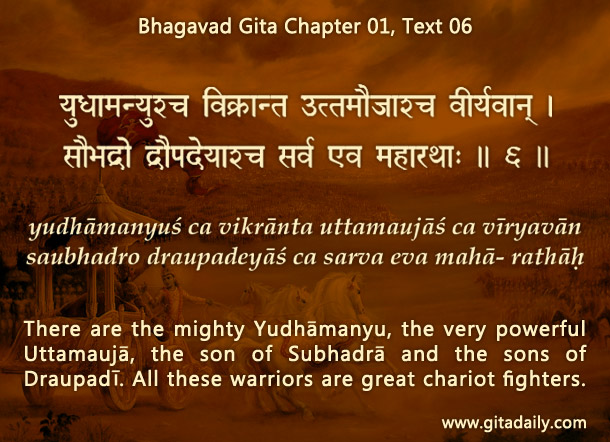Abhimanyu, the son of Arjuna and Subhadra, is a celebrated warrior. Though just sixteen, he merits a mention from Duryodhana (Bhagavad-gita 01.06) in his brief list of the foremost warriors in the two armies.
During the war’s thirteenth day, the Kauravas under Drona’s command plan to catch Yudhishthira by forming a formidable military formation called Chakravyuha. On the Pandavas’ side, Abhimanyu is the only available warrior who knows how to get into the Chakravyuha. But unfortunately he doesn’t know how to get out. Still, at Yudhishthira’s bidding, he penetrates it and wrecks havoc in the Kaurava ranks. But the supporting Pandava warriors are unable to follow him inside. Battling alone for hours, he gets exhausted and is slaughtered unfairly by six warriors who attack him simultaneously.
Abhimanyu’s martyrdom is glorious – he risks his life for the cause of dharma on his elders’ instruction and attained the supreme post-mortem destination. Additionally, this incident can convey an important lesson.
We all have some fundamental obligations, material and spiritual. But we may feel driven to do more. And that drive can be good – increased responsibility can help us discover untapped capacities, thereby stimulating our growth.
Still, we all have limitations. Moreover, we often have passionate minds and live in passionate cultures – both of which equate “more” with “better.” Under their double pressure, we may get into nonessential things that eat into our time meant for essential things, thereby leaving us stressed and overwhelmed. When too many things-to-do start shooting at us from all directions, we may find ourselves caught in a Chakravyuha of our own making.
So, when we get into new things, we would do well to have an exit plan for getting out through a responsible transfer of responsibility so that we can focus on the things most important for us.
To know more about this verse, please click on the image
Explanation of article:
Podcast:


It’s a wonderful exposition.
IT HELPS ME IN MY REAL LIFE.